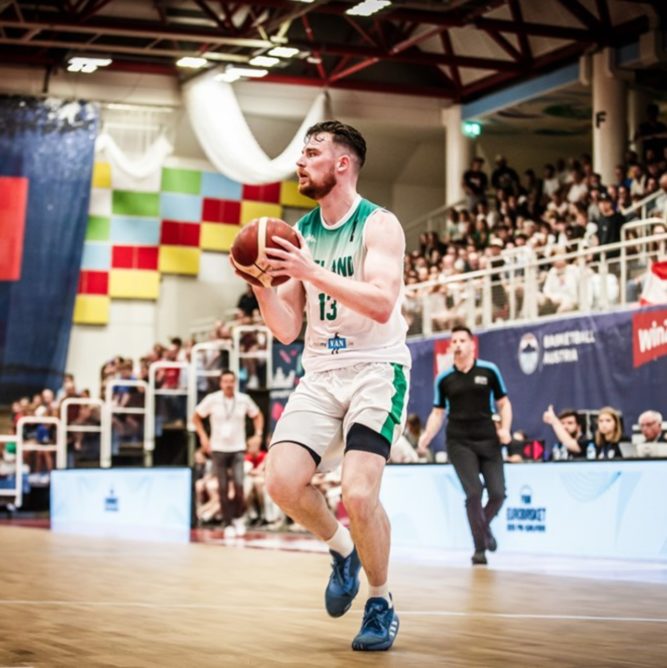
With direct progress all but mathematically ruled out in EuroBasket 2025 qualification, there’s an existential issue that Basketball Ireland needs to address after Sunday’s game with Switzerland
Formats can force decisions. They can make people get off the fence and give up humming and hawing. That’s what happened last summer after Ireland won the men’s FIBA European Championship for Small Countries. The decision to move up to the formal EuroBasket level of basketball was there to be made but it ended up having to be made quickly. That’s because FIBA decided on the yay or nay date for entering the 2025 competition soon after.
When faced with right now or wait until 2029, Basketball Ireland made the only realistic decision available and entered the first qualifying phase for the 2025 competition. The series has gone alright for Ireland, two heavy losses to a much stronger Austrian team, a competitive loss to Switzerland away, and two wins over Cyprus to give the men a chance at a .500 record by the end of this first phase.
The end of this phase however will bring up another question of now or wait another four years and Basketball Ireland simply has to say yes, even if the cost involved is a big gamble. After Sunday’s game, it looks likely that FIBA will introduce a form of repechage tournament for the teams that didn’t progress from the first phase.
If Ireland says yes to this then the EuroBasket journey and higher grade international games continue. If Ireland says no, it’s entirely plausible that the men’s senior team doesn’t play another competitive game until the tail end of 2025 or even later.
A complex challenge
The decision in the previous decade to move men’s EuroBasket from biennial to quadrennial added a wrinkle to the entire process. With the tournament being only every four years, the bulk of countries will play alternating qualification tournaments for EuroBasket and the FIBA World Cup respectively.
That bulk won’t necessarily include nations of Ireland’s ranking as entry to the pre-qualification for that, essentially the comparable level to where Ireland sits in EuroBasket, tends to be thinner and not engage every nation in the process. It gets confusing in a hurry and tends to get changed repeatedly but, essentially, it means Ireland needs to play as many games in EuroBasket 2025 qualification and progress as far as it can in order to guarantee that it is entered into the World Cup pre-qualifiers.
BallinEurope has a book, a real life actual book called I Like it Loud, and you can buy it on Amazon now. It’s here as a book and here in Kindle form.
The one positive from all this
This piece is about the men’s team only because, fortunately, the women’s side doesn’t face the same issue. Once its qualification process for EuroBasket 2023 concludes, it will be right back to action in the process for EuroBasket 2025. The women’s competition remaining biennial effectively guarantees 6 competitive games every two years for the women’s side at a minimum barring teams getting removed from the competition, like Belarus has been in the current instance.
Women’s World Cup qualification is directly tied to EuroBasket performance so it’s a much smoother format to follow and offers security of competitive games occurring for the generations Ireland is bringing through.
About those generations
The current campaign, indeed the current window, has seen a passing of the torch to the younger generation leading the national team. Jason Killeen retired after the Small Countries while Kyle Hosford retired at the end of May. Both have been great servants but, as both players will happily say, a big reason they’ve stepped aside is to clear a path for the talent coming through.
In Aidan Harris-Igiehon (21), CJ Fulton (20), ND Okafor (19), and Sam Alajiki (19) alone there’s a young core all playing or about to start playing college ball in the US stepping in to join a side that already has John Carroll (27), Jordan Blount (25), Sean Flood (25), and Taiwo Badmus (28).
With Badmus, who turns 29 on Sunday, comfortably the oldest of that group there’s a really strong core there of players developing coupled with those hitting their primes all under 30 and most with multiple campaigns in them to help them develop and, with the right breaks, make a crack at seriously contending for 2029 qualification.
Making the 2029 tournament is, objectively speaking, a long shot but shorter than you might think and would be made far more plausible if these players get more time and experience against nations that will be in that qualification conversation.
Exiting now would mean Carroll, who is unfortunately out until September 2023, won’t play another game that matters before he’s 30 while Badmus would potentially be 33 by the time it came about. That’s wasting the primes of two serious leaders while those younger than them would be missing out on valuable experience to be ready for that step up.
There is however an even longer term issue to think about.
The green jersey
There is nothing, and it really doesn’t come close, that gets a sport in the attention of young minds here, or really any mind, than national teams competing. It has been evident with hockey, cricket, rowing, and plenty more. If you want to develop young talent, you’ve got to help spark that dream and the easiest way to do that is showing them the green jersey competing on the top stage.
Looking at the performance of the Irish U16 girls recently in the four nations, where they walked past England, Scotland, and Wales, they have a clear path to join the generation that has reinvigorated the senior women’s side in recent times.
It’s easier to be confident about the development and progress of the women’s senior team because the path to progress, and with it the narrative that can be sold to the next generation, is clear.
With the men, it’s going to come down to cost. The short-term saving is eschewing any potential repechage tournament and not taking any form of financial risk. That however will prove far more costly in the long-run.
Back ourselves
The question facing the powers that be in Tallaght reminds me of when I interviewed Warren Deutrom, the chief executive of Cricket Ireland, in 2018. In 2013, he’d made a big bet on the weather. It cost €500,000 to stage an international with England for the men’s national team. Had it been rained off, it would have been existential for the association. Instead, the sun stayed out and the organisation ended up making a profit of €500,000 off the event. A few years later, the men’s team was granted test status.
I don’t know the exact cost facing Basketball Ireland for keeping the men’s national side going competitively through the next stage but it’s a lot closer to €50 than €500,000 and it’s certainly not an existential amount. The payoff won’t immediately be as big either but, long-term, it could be foundational for the growth of the sport.




Leave a Reply